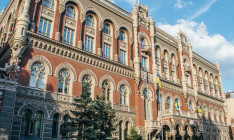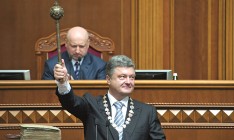Politics
hot spotKyiv has no strategy regarding the Donbas

Authorities in Kyiv responded to the elections held in the breakaway DPR and LPR last weekend. But for now it is hard to say that Kyiv’s position is distinct or articulate. President Petro Poroshenko insists on the abolition of the Law On the Special Status of the Donbas, but at the same time he does not rule out adoption of a similar document with the new date of elections and a special economic zone.
Broken law
At the meeting held yesterday the National Security and Defense Council (NSDC) decided to ask the parliament to revoke the Law On the Special Status of Local Government in Donetsk and Luhansk Oblasts. The possibility of such step was mentioned the other day in the address of President Poroshenko to the people of Ukraine. He said the elections held in the self-proclaimed republics of the Donbas on November 2 violated the Minsk Agreements.
“We are ready to adopt a new law and set a new date for the elections,” said the president at the meeting of the NSDC. “We are ready to clearly define the territory in which the elections will take place in accordance with the Ukrainian legislation, and a special regime of local governance will apply.
Moreover, we are ready to provide special regime of a free economic zone where business entities registered in these territories will have special economic relations with the EU, as well as special economic relations with Russia,” added Poroshenko. He also said that the abolition of the Law On the Special Status of the Donbas did not mean Kyiv’s withdrawal from the Minsk Agreements. Poroshenko also threatened to impose a more stringent economic regime in Luhansk and Donetsk oblasts, reminding of gas and electricity supplies to the territories insubordinate to Kyiv.
Advisor to the President Oleh Medvedev says that that the possible repeal of the Law On the Special Status “does not mean any resumption of hostilities”. Chairman of the Luhansk Oblast State Administration Hennadiy Moskal believes that the law has “served its purpose” having not even entered into force. “The law encouraged de-escalation. Adopting the law Ukraine reached out to the Donbas. However, the parliament itself did nothing to complement the special status with other laws that would explain its powers in appointment of prosecutors and judges. Finally the law was finished off by the separatists themselves, which illegally held their elections,” said Moskal.
Deputy Chairman of the Procedure Committee Valeriy Karpuntsov (UDAR) said that the Rada would have enough votes for repeal. Moreover, he did not rule out that MPs could gather for an emergency meeting.
Noteworthy, the Law On the Special Status of Local Government in the Donbas was adopted on September 16. This piece of legislation introduced a special procedure for control in the areas insubordinate to the central government for 3 years. The law contains provisions on financing of these areas from the state budget, formation of the People's Police, judicial and prosecution bodies. In addition, the law envisaged holding of local elections in areas controlled by the DPR and the LPR in accordance with Ukrainian legislation on December 7.
Emotions instead of strategies
Former Spokesman for the Foreign Ministry of Ukraine Oleh Voloshyn says the president’s decision to initiate the repeal of the Law On the Special Status of the Donbas Region through the National Security and Defense Council is “emotional”. “Kyiv does not want a new round of confrontation with the separatists supported by Russia and will try to avoid escalation of the conflict. But the president’s statement is more of an emotional reaction to the elections in the DPR and the LPR,” said Voloshyn. Professor of the Department of International Policy at the Uzhhgorod National University Ihor Todorov, who worked at the Donetsk National University for years, believes that Poroshenko’s recent statements regarding the new date of elections show that Kyiv has no clear strategy for the Donbas.
“The Ukrainian leadership is hesitant about its decisions and responds only to emerging challenges. The law was originally stillborn because the militants refused to execute it. The president understands that the law should be abolished, but at the same time he mentions the possibility of a compromise by offering economic rewards. I am convinced that he could not say this without holding consultations with western partners, who do not want a new round of war,” said Todorov. Political analyst Vitaliy Bala has a similar view. “Judging by the actions of the president it becomes clear that he adapts to the situation. Today, there are no signs of some sort of strategy developed in Kyiv,” he said.
In his turn, lawmaker Andriy Pavlovskiy (Batkivshchyna) does not rule out that the president’s threats against the self-proclaimed republics and statements on the abolition of the law could be focused solely on the internal audience. Pavlovskiy reminded that the president did not even specify which parliament he addressed – the new one or the current one.
Meanwhile, the leadership of the self-proclaimed DPR has already declared its readiness to hold talks with official Kyiv, though it criticized the idea of a special economic zone.












 of the agreement of syndication with Financial Times Limited are strictly prohibited. Use of materials which refers to France-Presse, Reuters, Interfax-Ukraine, Ukrainian News, UNIAN agencies is strictly prohibited. Materials marked
of the agreement of syndication with Financial Times Limited are strictly prohibited. Use of materials which refers to France-Presse, Reuters, Interfax-Ukraine, Ukrainian News, UNIAN agencies is strictly prohibited. Materials marked  are published as advertisements.
are published as advertisements.